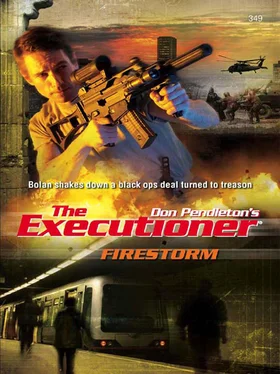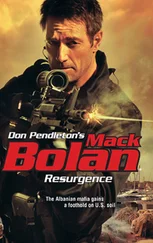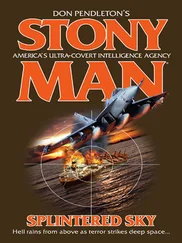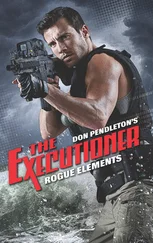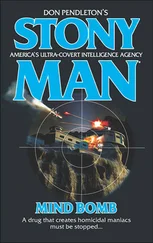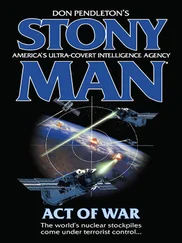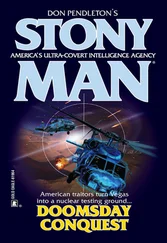“Did he arm Serrano’s team?”
“Can’t say for sure,” Brognola replied. “But, it’s likely he did, and he’ll tell us what we want to know. I’ll let him know you’re coming.”
B OLAN GUIDED THE CAR into a curved driveway that led to an iron gate. He parked and waited for a guard to appear. Jack Grimaldi undid his seat belt and opened his windbreaker, giving him better access to his handgun.
A minute later, Bolan sensed someone coming. He looked into the rearview mirror and saw three guards approaching the car from the rear. Two of the men stopped a few yards behind the vehicle and stood on either side of it, their FN submachine guns cradled in plain view.
A third man came up alongside the car and stopped just behind Bolan’s shoulder. The position made it easier for him to get the drop on the Executioner, should he make a play for a weapon. The guard, a scarecrow-thin man with a bushy black mustache, his eyes shaded by a billed cap, rested his hand on his sidearm.
“Quick,” Grimaldi said, mock urgency in his voice, “hide the joint.”
“Comedy,” Bolan said. “Just what we need.”
The Executioner rolled down his window. A blast of hot air tinged with oppressive humidity blasted his face.
“Can I help you?” the guard asked.
“Matt Cooper,” Bolan said. “I’m supposed to meet Mr. Wallace.”
“ID?”
Bolan dug out the leather carrying case that contained his wallet from the cup holder built into the car’s console. He handed it, already flipped open, to the guard. The man studied it, nodded and handed it back. They repeated the process with Grimaldi. Then the guard reached up and keyed the microphone clipped to his shoulder and ordered the gate open.
Once inside the compound, Bolan navigated the car along the curved driveway. He noticed most of the land around the house was stripped of trees and most shrubs, for security purposes, he assumed.
The rooftop became visible before the rest of the house did. He turned another corner, followed the driveway as it dipped and finally rolled up in front of the big hacienda-style house.
Wallace stood in the driveway and watched them roll in. Except for the Glock that rested on his hip, he otherwise looked like a father waiting to take his kids to soccer practice. He wore a polo shirt, khakis and brown loafers. His wide face seemed to swallow up a pair of glasses with small, round lenses that were perched on his nose.
Bolan parked the vehicle. He and Grimaldi exited it.
Wallace ambled toward them. He shook hands first with Grimaldi and then with Bolan, who found his handshake firm and confident.
“Sorry about the theatrics,” Wallace said. A soft Southern accent colored his voice. He made a sweeping wave that took in his house and a pair of Mercedes SUVs parked nearby. “People see all this and they want to help themselves to it. They can have it. But it’s my family I worry about. Place is filthy with kidnappers.”
“Understood,” Bolan said.
“Come inside,” Wallace said.
They followed Wallace through the house, ascended a circular staircase that led to the second floor and adjourned to Wallace’s luxurious study.
Several bottles of water and a carafe of coffee stood with some cups at the center of a small conference table ringed with chairs.
“Help yourselves to a drink,” Wallace said. “Cop a squat. Do whatever you want. Any friend of Hal’s is a friend of mine.”
Wallace seated himself at the conference table. He took a bottle of water, twisted off the cap and gulped some. Grimaldi took a seat at the table while Bolan continued to stand.
“Did Hal tell you why we’re here?” Bolan asked.
“He told me enough,” Wallace replied. “I work with the Feds on pretty big projects, so my clearances run pretty high. Not bragging. Just letting you know that I have access to things other nongovernment folks can’t touch. Hal said that a CIA ops team that was looking into Garrison went missing. Said you’d come down here to find them.”
“You familiar with the team?” Bolan asked.
“I provided them with some surveillance equipment,” Wallace said. “And a secure phone, along with a few pistols and submachine guns. They were under nonofficial cover, so they couldn’t go through any of the traditional channels. They couldn’t go near the embassy or meet with anyone from the local CIA station. It’d raise too many eyebrows.”
“Meeting with you wouldn’t?” the Executioner asked.
Wallace nodded. “Hell, yeah. But they didn’t meet with me. I have a couple of freelance operatives I run around here. I used one of them to pass things along.”
“Which means they met at least some of the team.”
“Wrong,” Wallace said, a hint of irritation in his voice. “I’ve done this a few times, remember? My guy was brand-new to the area, an unknown quantity to everyone but me. I had him leave the stuff at a dead drop, get the hell out of there before the recipients arrived. He never met anyone face-to-face. I monitored the drop by camera until someone picked up the gear.”
“Was it someone from the team?”
“Of course,” Wallace said. “I would’ve sounded the alarms in Washington if it’d happened some other way.”
Bolan nodded. “Have you heard anything from them since?”
“Not personally,” Wallace said. “But I am hearing other stuff. Funky stuff.”
“Like?”
“I’ve got a couple of buddies with MI-6. Occasionally, I do a little work for them. They have a couple of guys on the ground here in Colombia, including a guy named Richardson. Ethan Richardson. He does a lot of the same work I do here. He’s just not quite as choosy about his clientele. It’s all just business to him, whether it’s Hezbollah or the Chinese. That’s his reputation and he likes it.”
With loud gulps, Wallace guzzled down more water.
“A few hours ago, someone contacted him. An American. The guy was looking for weapons. It was a stupid move on his part, too. He wanted a couple of handguns and an Uzi. This place is lousy with that kind of stuff. But he called the Brit who was more than happy to sell him the guns. And then he immediately called me and passed along the information.”
“For a price,” Grimaldi said.
A weary smile spread across Wallace’s features. “Friend, nothing comes free in Colombia. Anyway, Richardson assumed that I’d want more information on this American even before we spoke. Once he sold him the weapons, he put a tail on him so we know where he’s going. He also gave me a picture.”
He punched a key on his laptop, turned it around so Bolan and Grimaldi could see it. Bolan saw a pair of photos positioned next to each other on the screen. In one, the soldier observed the grainy image of a man wearing a baseball cap. The second depicted a close-up shot of the man’s face. It was a Caucasian with a flat, wide nose and thick black eyebrows and dull brown eyes.
“Michael Stephens,” Wallace said.
“What do we know about him?” Bolan asked.
“Drifter, of sorts. He used to be with U.S. Army intelligence. According to his file, he was sharp. But he couldn’t stand to take orders from anyone. He took a swing at his sergeant over something petty, like a bad evaluation. The guy repaid him with a busted nose and a dishonorable discharge. He blew a twelve-year career over something stupid. He scrounges around for information, occasionally comes across something that he can sell to us, the Colombians, the rebels, whoever might buy it. Most of what he learns is penny ante stuff, including things compiled from foreign newspapers that he rewrites into intelligence reports. I buy it anyway, just to keep some goodwill with him. Occasionally he comes across something I can use or pass along to someone else. But we have to watch him. He’s a backstabber.”
Читать дальше
